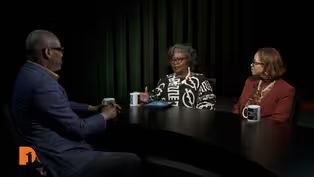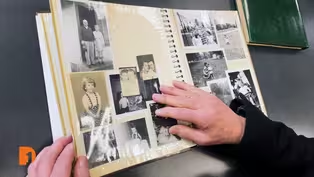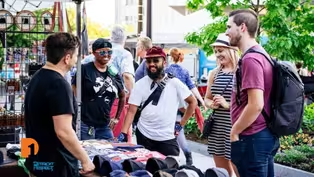
Down South to Detroit: Stephen Henderson shares his family’s Great Migration story
Clip: Season 9 Episode 41 | 7m 51sVideo has Closed Captions
Detroit native Stephen Henderson details his family’s history during The Great Migration.
Many African American families migrated from the South to Detroit during the Great Migration, including One Detroit contributor Stephen Henderson’s family. As part of our “Destination Detroit” initiative, One Detroit is collecting stories of families who’ve come to the Detroit area. Henderson shares his family’s migration story and the lives they created in Detroit.
Problems playing video? | Closed Captioning Feedback
Problems playing video? | Closed Captioning Feedback
One Detroit is a local public television program presented by Detroit PBS

Down South to Detroit: Stephen Henderson shares his family’s Great Migration story
Clip: Season 9 Episode 41 | 7m 51sVideo has Closed Captions
Many African American families migrated from the South to Detroit during the Great Migration, including One Detroit contributor Stephen Henderson’s family. As part of our “Destination Detroit” initiative, One Detroit is collecting stories of families who’ve come to the Detroit area. Henderson shares his family’s migration story and the lives they created in Detroit.
Problems playing video? | Closed Captioning Feedback
How to Watch One Detroit
One Detroit is available to stream on pbs.org and the free PBS App, available on iPhone, Apple TV, Android TV, Android smartphones, Amazon Fire TV, Amazon Fire Tablet, Roku, Samsung Smart TV, and Vizio.
Providing Support for PBS.org
Learn Moreabout PBS online sponsorship(upbeat music) - Like many other people here in the city, and especially many African Americans, my family came from the South on both sides to Detroit at different times.
My mother's family came in the late 1950s.
My grandfather, her dad, was an auto worker and a union official in Cincinnati.
He had been born in Valdosta, Georgia.
His family moved to Cincinnati when he was a teenager.
He marries my grandmother, and they raise their kids there.
And he becomes this sort of point of interest for Walter Reuther, who founded the UAW and was running it.
And he needs my grandfather in Detroit to help him connect the union with the growing Black political class, among other things.
I mean, there's this growing Black population in the city in the late 1950s because of this big move from the South.
And Walter Reuther is really interested in that.
And so he recruits my grandfather and a guy named Horace Sheffield, whose son is still around, and whose granddaughter is the current president of the city council.
- And that is why we are working today.
(audience cheering) - Horace Sheffield and my grandfather, William Beckham, Sr., were great friends and close associates who helped the union through that period.
- Segregation is wrong, because it is nothing but a new form of slavery covered up with certain niceties of complexity.
(audience cheering) - [Stephen] The UAW was really instrumental in getting Martin Luther King here to do the March for Freedom.
In the summer of 1963, before the March for Freedom in Washington, he marches down Woodward Avenue and delivers his I Have a Dream speech, the very first public deliverance of that speech at Cobo Hall.
- So because of the legacy of slavery and segregation, many Negroes lost faith in themselves, and many felt that they were inferior.
But then something happened to the Negro.
- The UAW, with my grandfather, and Horace Sheffield, and lots of other people who were involved, that's how that happened.
I don't know all of the details of that story, but I know it was not an easy thing to pull off.
There was a lot of resistance to the idea of King.
He was seen by that point as something of a radical.
Lots of people didn't want this to happen in Detroit.
And the UAW and Walter Reuther in particular stood up and said, "No, no, no, we've gotta make this happen."
(crowd shouting) - [Crowd] Now, now!
- I do remember, for instance, that they moved to Detroit and they moved to Russell Woods, which is actually a place where if you just go down the roster of notable African Americans in this community in the last 50 years, a lot of 'em come out of that neighborhood.
Saul Green, who was the US attorney, Joann Watson, all the kinds of people grew up in that neighborhood.
But when my family moved there in the late 1950s, it was a predominantly overwhelmingly Jewish neighborhood.
And there were covenants that prevented African Americans from buying those houses for a long time.
And so my family was among the first families, African American families, to be able to live in Russell Woods.
And I've heard lots of stories about what that was like.
The neighborhood was starting to change.
At the end of their block, there was a synagogue, and across the street from it, a Hebrew school.
By the time I was born in 1970, my memories of that block, that was a public school and a Baptist church.
That's how quickly the neighborhood changed once African Americans started moving in.
My father, whose story is different from my mom's family, he doesn't come until he is in his, I guess, late twenties.
And he comes as an adult to escape, really, the Jim Crow South.
He's born in Natchez, Mississippi in 1933.
And you know, that's a place that is kind of a pivotal place in the antebellum South.
It is an important trading place for not just cotton, but also slaves.
It's also a center of human production of slaves after Congress bans the import of Africans in the early 1800s.
Some cities and some places in the South become breeders of human channel.
And that just is one of the places that was most prolific.
And so my dad's born, you know, 50 years, 60 years after the war ends.
In fact, he grows up and goes to serve in the Air Force during the Korean War, and comes home, and is not allowed to vote.
He can't get the GI Bill, which is in place for people coming back from that war as they were for others, because in Natchez, the schools that they would've paid for him to go to did not admit African Americans.
The neighborhoods where he might have bought a house with a loan through the GI Bill didn't sell property to African Americans.
And so his life was not going to develop, I think, the way he would've wanted it to if he stayed.
So he moves North in, I think, the early sixties.
I think it's a little later than my mom's family to find that opportunity.
- [Bill] In Detroit?
- [Stephen] In Detroit.
- [Bill] Why Detroit?
Do you know?
- You know, I don't know why he came to Detroit.
He's not an auto worker.
He never, to my knowledge, works in the auto industry.
He becomes a social worker and works at Lafayette Clinic, which was a pretty important mental health institution just east of downtown Detroit.
I don't know why he comes to Detroit.
Maybe he had a friend here, maybe he had just heard about opportunity.
You know, Detroit was seen by African Americans in the South as a place that offered more opportunity than where they were.
Detroit and Chicago are probably the biggest beneficiaries, in fact, of that migration.
But I just don't know that story.
- [Bill] You haven't talked to him about it, or are you- - Well, my dad died when I was 14, so I never had the chance to have that conversation with him.
I go back to Natchez now pretty regularly.
I try to go once a year and try to connect, reconnect the dots, right?
Like find more about our family, find more about him, but also learn more.
I've learned a lot more about the city itself and its history.
I mean, it's a very different place.
I mean, it's very interesting.
Even in 2024, which is the last time I was there, it is a different part of the world.
- [Bill] Now would you say your story is pretty common, uncommon, unique?
How would you summarize what you've done?
- I think this is a very common story is my sense, but it's a commonly unknown story, right?
I think there are tons of people who, if they had the opportunity to go back and look at where they're from, they would find equally surprising, joyful, and painful things, and most of us don't know, I think, past a certain point, what all those things are.
So, yeah, I don't think this is unusual.
I just think I'm getting this special opportunity, I guess, to look more deeply into it.
Black women’s influence in the church and community during the Great Migration
Video has Closed Captions
Clip: S9 Ep41 | 6m 7s | Two Detroit ministers discuss women’s impact in the church and community during the Great Migration. (6m 7s)
From Southern Kentucky to Garden City: Nolan Finley shares his family’s Great Migration story
Video has Closed Captions
Clip: S9 Ep41 | 7m 20s | One Detroit contributor Nolan Finley shares his family’s history during the Great Migration. (7m 20s)
One Detroit Weekend | Things to do around Detroit this weekend: April 11, 2025
Video has Closed Captions
Clip: S9 Ep41 | 2m 3s | Contributors Haley Taylor and Peter Whorf share upcoming events happening around metro Detroit. (2m 3s)
Providing Support for PBS.org
Learn Moreabout PBS online sponsorship
- News and Public Affairs

Top journalists deliver compelling original analysis of the hour's headlines.

- News and Public Affairs

FRONTLINE is investigative journalism that questions, explains and changes our world.












Support for PBS provided by:
One Detroit is a local public television program presented by Detroit PBS


